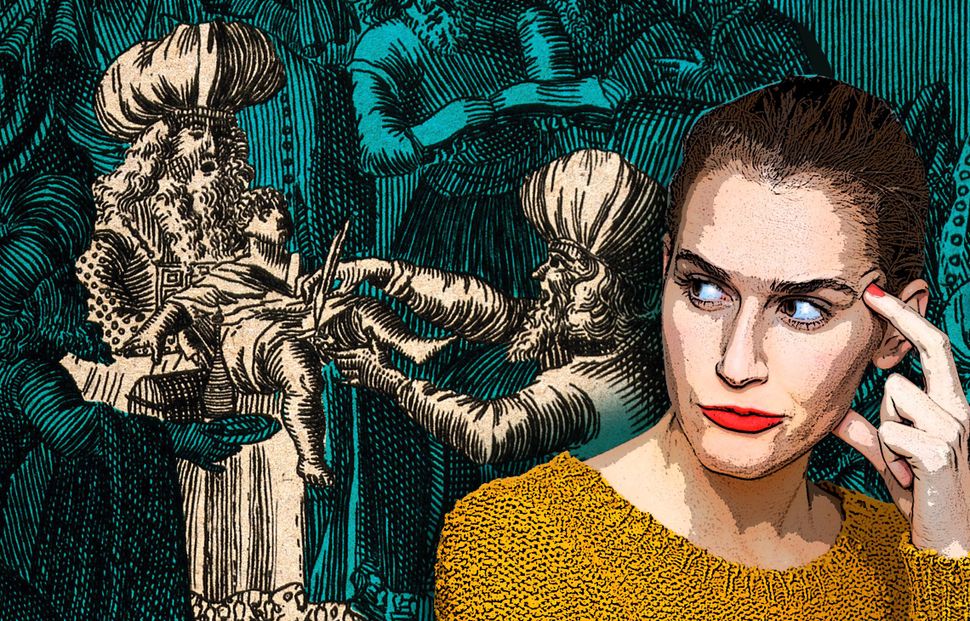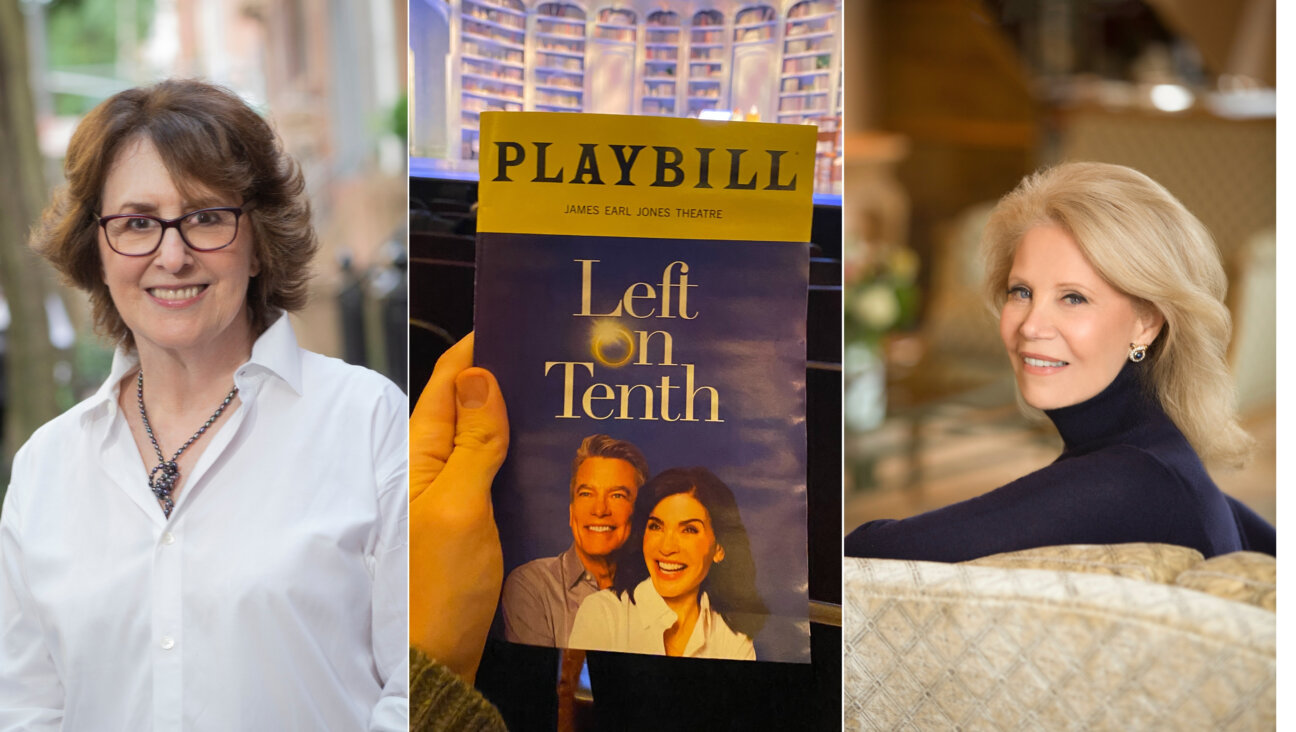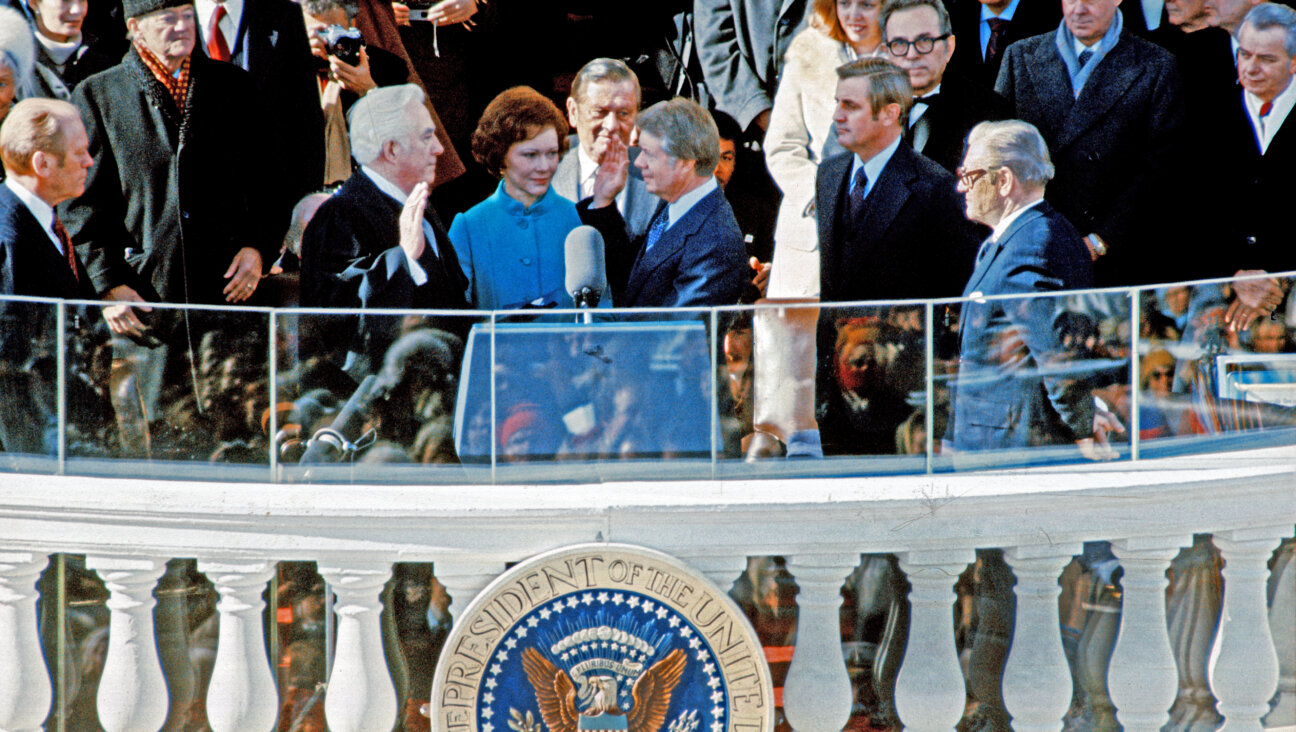What I Lost Growing Up in a Home With No Religion

Image by Nikki Casey
At the age of twenty, in Columbia’s School of Graduate Studies, I met the young philosophy student I would marry a year later. His mother had been recently widowed and, during her year of mourning, had developed a close friendship with her rabbi. When we announced our engagement, she expressed the wish that we would choose this rabbi to officiate at our wedding. My own family had no rabbi, no religious tradition, no religion at all. Had the matter been left to them, they would have opted for the same City Hall ceremony they and their siblings all chose. Without giving it much thought, I agreed to my future mother-in-law’s request.
I approached the pre-marital interview with the rabbi with an uncomfortable feeling I mistook for reverence. He began by recalling that my fiancé was a stellar Bar Mitzvah student. Then, he reminded us what a significant journey we are embarking upon. It was the nineteen-sixties, and we thought he should be happy to be asked to perform a marriage ceremony at a time when so many of our generation were dispensing with them or, even worse, declining to marry at all.
I felt satisfied, as the hour wore on, that we were saying all the right things; I knew I was trying hard to oblige. Until suddenly, things turned bad.
“And do you plan to have your sons celebrate a Bar Mitzvah?” The rabbi was nodding, as if to signal the correct answer.
My tongue, as the Torah put it, cleaved to the roof of my mouth. Were we supposed to have thought about that? I did want children. Someday. But just then, I was immersed in reading Hegel. I wanted to get married and make a home lined with bookshelves where my husband and I could continue our studies. Those were my plans at the moment, and they seemed challenging enough. I had no idea what I would do about children. It seemed presumptuous to plan so far ahead, and I told the rabbi so.
He frowned. Preparing for doctoral exams was apparently not an appropriate way to approach marriage. Perhaps we were not ready to proceed? If we wanted him to officiate, we’d have to re- consider. We would have to make plans.
My future bridegroom and I struggled to maintain solemn demeanors. “I’m sure,” said my fiancé, “that if we have sons, they will have Bar Mitzvahs. I was raised that way, and my sons will be as well. No problem.” He nodded toward me, urging me to agree.
I should have nodded back and let the matter drop. But I couldn’t. I wanted to make it clear that I had definitely not been “raised that way.”
“You may not have heard of my paternal grandfather, Henry Greenfield,” I begin. “He was managing editor of The Jewish Daily Forward, and the manager of its affiliated radio station, WEVD.”
The Jewish Daily Forward was an organ of the Socialist party in New York, read by countless left-leaning Jews; the call letters of its radio station were the initials of the eminent labor leader, Eugene V. Debs. You could mention either of these and people would know: My grandfather was a lefty, a laborite ATHEIST! A man with three sons, none of whom had had a Bar Mitzvah.
The rabbi gazes upon me indulgently. “Those were well-meaning people,” he says. He goes on to explain that my grandfather was one of a brave group of reformers whose time had passed. America has produced livelier forms of Judaism. My grandfather’s beliefs, though admirable at the time, are now obsolete.
Obsolete? My grandfather?
“—I believe my grandfather had all the right ideas,” I interject. I liken my family to the protesters of the present day, to Martin Luther King. I point out the Scandinavian countries where socialism is a productive, happy way of life. I make a rambling, unoriginal speech about the role of religion in the rise of capitalism.
I recall a story that has risen, in our family, to the level myth: When my father’s sister married my uncle, the groom’s father, an Orthodox rabbi, was inconsolable. “It would have been better,” he remarked sadly to my grandfather, “if my son had married a Catholic. At least they believe in God!” My family loves this story.
“No one in my family,” I proudly inform the rabbi, “has had a religious wedding. I’m agreeing to this, but please don’t ask about possible children. Who can say if we will have any, or what they will want at thirteen?” When I stop, I discover I’ve been shouting.
The rabbi is in no mood to continue. Either I promise the Bar Mitzvahs or he will decline to officiate. He sends us home to “think it over.”
The future groom and I drive to his mother’s home in silence. At dinner, he explains that we’ve hit a snag.
“Why don’t you just go along with him?” his pragmatic mother wants to know. “You’re making a mountain of a molehill.”
I have, of course, recognized the interview as one of those times when you should humor someone to get what you want. Why have I created such a fuss?
Curled in a tight ball on the guest room bed, I tell myself that my first obligation is to defend my grandfather. I spent the sunny first six years of my life sitting on his lap each morning at breakfast; I adored the “gold rings” that slid off his cigars. What irks me, I tell myself, is the rabbi’s bold assertion that my entire upbringing was… obsolete!
I wake when it is barely light and turn the pillow to its cooler side. Alone in this quiet moment, I must confess that I, myself, have never been a socialist, have never even marched on a picket line or in a civil rights demonstration. Why do I feel so personally accountable for my grandfather’s decisions, so defensive of his atheism? It is the nineteen-sixties and I have my own bones to pick with my family; I don’t need to be defending them just as I’m taking my leave.
When we return to the rabbi, my fiancé explains that we’ve thought it over.
“I realize my mistake,” I say politely. “I now see the importance of training my children in Judaism, and instilling Jewish values.” I sound like Betty Furness selling Harvest Gold refrigerators.
This does the trick. The wedding will proceed.
But the disturbance I feel about my grandfather and me, about my parents and me — about Judaism and me — remains. It rolls into another tight ball and goes back to sleep.
Five years after my tussle with that rabbi, our first child, Joshua, is born. Again, it is my mother-in-law who takes up the cause for Jewish tradition: the infant should be circumcised in her home, on the same antique desk where my husband had, in fulfillment of the covenant, given up his foreskin.
Exhausted from natural childbirth, yet still high on hormones, I agree. In fact, I say I would be honored.
My brother, I recall, had been circumcised by a surgeon before my parents brought him home from the hospital. So had all my cousins. I have never attended a ritual circumcision. To the new owner of an old Victorian house quickly filling with dusty used furniture and old-fashioned lace, the prospect of an in-home service featuring a family heirloom holds ineffable charm.
When Josh is eight days old, he is dressed in a new baby-blue onesie, swaddled in a crocheted blanket, and handed up to the circumciser in my mother-in-law’s bedroom before the same oval desktop where his own father had been similarly handed over. My grandfather cradles the baby on a pillow and weeps; the baby lets out a righteous scream and is quickly subdued with a dab of wine to his lips. The mohel says a prayer and then everyone shouts mazel tov. To me. To the father. To the grandparents. To each other. Yet another male consecrated to the tiny, faltering tribe!
“And so now,” says my mother-in-law, “about the pid’yon ha-ben. Do you want me to do that here, too, or will you take care of it?”
I have no idea what she’s referring to, but I already know her well enough to understand that she wants “it”—whatever it is—to be held at my home.
I draw a deep breath and smile. “Oh, sure. We can do it.”
We had recently purchased what I intended to be a family home for generations to come, a thirteen-room welter of problems sold as a “fixer upper.” It featured both a bidet in the upstairs bathroom and a whiskey-making still in the cellar beneath the outbuilding. We had managed to refurbish the kitchen and paint our bedroom and the nursery, but the rest of the house was in utter disrepair. Apart from the kitchen, there was nowhere for guests to sit.
On my husband’s side of the family, scores of relatives would come to congratulate his mother; on my side, there would be great interest in the big old house and even more curiosity about the strange ritual to be performed there. A veritable mob would descend. Only fair weather would permit that ritual to proceed.
Thirty days after Josh’s birth, we are about to purchase our own son for five silver shekels from a descendant of an ancient tribe of priests. I have dutifully read up on this ceremony and now know that it stems from the covenant God handed down after sending ten plagues upon the Egyptians, while sparing His people from the worst plague, the death of the first-born son. In that moment, Israel became His people; in exchange, the first-born son of every Israelite woman was foresworn to serve Yahweh as His priest.
But then, in the wilderness, while Moses was up on the mountain writing down the commandments, the people below fashioned for themselves a god in the form of a golden calf, and there was hell to pay. The Lord said he wanted none of the sons of these idol worshippers to serve as His priests, but only the sons of the tribe of Levi, for they alone had refrained from idolatry. One Levite was taken into service to redeem each of the other Israelites, but there were not enough Levites to complete the job. Those whose first-borns could not be redeemed, were to pay a redemption fee of five shekels to the priests to release their firstborns from servitude. The liberation of the Israelites from bondage in Egypt—and so the preservation of the Jewish people unto this day — is owed to the way God acted to save these first-born sons. Thus, even today, Jews must redeem from the priests a son who is the first fruit of his mother’s womb.
What my mother-in-law had set in motion, then, was the ransoming of our son. We’d need five silver shekels and a descendant of the Ko-hen tribe to sell us our first fruit. Usually, anyone with the last name of Cohen — or Kohn, or Kahn or Cahn — will tell you he’s your man. He can supply the silver required for the transaction, and he’ll know the prayers to say and the words the child’s father must say to seal the deal. Fortunately, my mother-in-law is able to supply a distant cousin who is a Cohen. Hy. Hy Cohen.
We are expecting over sixty people. As the day dawns dark and rainy, we try to calculate how much of the rented lawn furniture will fit inside the house.
But the Lord is with us. The rain clears and, by the time our guests arrive, we are ready. No bagels and lox, no smoked fish, no ruggeleh, no babka. On a long folding table, we set out what James Beard, the most celebrated chef du jour, recommends as a summer Sunday picnic. Kosher wine for the ceremony, of course, but then rum punch as recommended by Beard. Having redeemed our son from his fate as a Jewish priest, we drink the wine and eat the frijoles and turkey, scarf down the brownies, and laugh and laugh until everyone finally departs.
Gazing out across the lawn littered with white plastic chairs and crumpled napkins, I beam at my newly-redeemed child. Our first-born, and the first of what we hope will be countless more celebrations in the sagging old house. During the summer we’ll whitewash the fence, plant some new trees and make a bed for zinnias, our favorite flower. We’ll keep a section of the lawn unmowed to shelter the rabbits who’ve taken up residence there. During the winter, we’ll paper the hallway and strip the thick brown paint from the stairs; we’ll build shelves in the sunroom that will be our library. We have plans, upon plans, upon plans.
Were the rabbi who married us to ask me on this glorious day if I would encourage my son to study for a Bar Mitzvah, I would not hesitate to say “yes.” When you have watched your baby slip into the world and heard his first cry, when you have stroked his dewy, translucent cheek, and watched his dark lips part to reveal shiny pink gums, you are ready to accept miracles—miracles and myths and all the garlands and fairy dust of the rituals that tumble after them.
Snuggling my new grandson, so sweet-smelling after his bath, I mention a pidyon ha ben to my son who shrugs and flashes a quizzical look. Patiently, I explain the ritual. I also want to explain what gives a ritual its meaning, and this is a tougher challenge. The purchasing of a child with money borrowed from a fellow named Cohen who is the one who will sell you the child, doesn’t make much sense. But it is true, as Pascal claimed, that La coeur a ses raisons que la raison ne connait point.
Why could I not see it this way when I objected so vociferously to that rabbi’s question about a Bar Mitzvah for my own son who was then not even a twinkle?
All these years later, I know it was not my grandfather and our family I was defending from the rabbi, it was myself. I was hiding from my own guilty sense of insufficiency, and protesting the assumption that I understood what Judaism required of me when, in fact, I did not.
I was defending myself, too, from the rage I felt toward the family that had deprived me of what I realized, even then, was a rich and rewarding tradition of rituals and celebrations. I was shielding myself from sensing, without acknowledging, how much I had missed growing up in a home with no religion.
I had shouted at the rabbi because I was neither an observant Jew, nor one of those newer, revitalized Jews he had mentioned. I was not a socialist or an atheist. I was only furious and very, very sad. Immersed as I was in ancient and modern philosophy, I understood that religion had followed human beings around since the beginning of time, and I was too deeply sorrowed to admit that my parents had provided me with none of it.
I was defending myself from the knowledge that I was a “none.”
Susan Pashman is the author of the novel “Upper West Side Story.”
A message from our Publisher & CEO Rachel Fishman Feddersen

I hope you appreciated this article. Before you go, I’d like to ask you to please support the Forward’s award-winning, nonprofit journalism so that we can be prepared for whatever news 2025 brings.
At a time when other newsrooms are closing or cutting back, the Forward has removed its paywall and invested additional resources to report on the ground from Israel and around the U.S. on the impact of the war, rising antisemitism and polarized discourse.
Readers like you make it all possible. Support our work by becoming a Forward Member and connect with our journalism and your community.
— Rachel Fishman Feddersen, Publisher and CEO




















